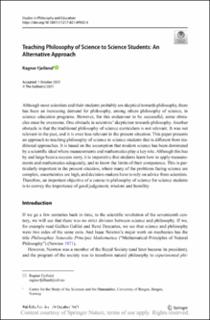| dc.contributor.author | Fjelland, Ragnar | |
| dc.date.accessioned | 2022-01-27T08:08:56Z | |
| dc.date.available | 2022-01-27T08:08:56Z | |
| dc.date.created | 2021-12-03T13:56:09Z | |
| dc.date.issued | 2021 | |
| dc.identifier.issn | 0039-3746 | |
| dc.identifier.uri | https://hdl.handle.net/11250/2876924 | |
| dc.description.abstract | Although most scientists and their students probably are skeptical towards philosophy, there has been an increasing demand for philosophy, among others philosophy of science, in science education programs. However, for this endeavour to be successful, some obstacles must be overcome. One obstacle is scientists’ skepticism towards philosophy. Another obstacle is that the traditional philosophy of science curriculum is not relevant. It was not relevant in the past, and it is even less relevant in the present situation. This paper presents an approach to teaching philosophy of science to science students that is different from traditional approaches. It is based on the assumption that modern science has been dominated by a scientific ideal where measurements and mathematics play a key role. Although this has by and large been a success story, it is imperative that students learn how to apply measurements and mathematics adequately, and to know the limits of their competence. This is particularly important in the present situation, where many of the problems facing science are complex, uncertainties are high, and decision-makers have to rely on advice from scientists. Therefore, an important objective of a course in philosophy of science for science students is to convey the importance of good judgement, wisdom and humility. | en_US |
| dc.language.iso | eng | en_US |
| dc.publisher | Springer | en_US |
| dc.rights | Navngivelse 4.0 Internasjonal | * |
| dc.rights.uri | http://creativecommons.org/licenses/by/4.0/deed.no | * |
| dc.title | Teaching Philosophy of Science to Science Students: An Alternative Approach | en_US |
| dc.type | Journal article | en_US |
| dc.type | Peer reviewed | en_US |
| dc.description.version | publishedVersion | en_US |
| dc.rights.holder | Copyright The Author(s) 2021 | en_US |
| cristin.ispublished | true | |
| cristin.fulltext | original | |
| cristin.qualitycode | 2 | |
| dc.identifier.doi | 10.1007/s11217-021-09802-8 | |
| dc.identifier.cristin | 1964384 | |
| dc.source.journal | Studies in Philosophy and Education | en_US |
| dc.identifier.citation | Studies in Philosophy and Education, 2021. | en_US |

